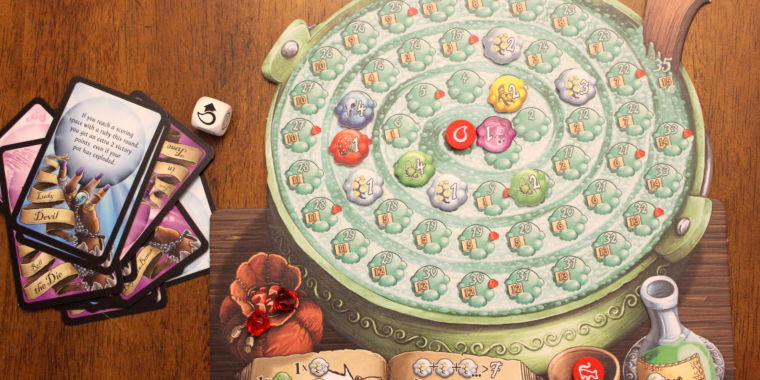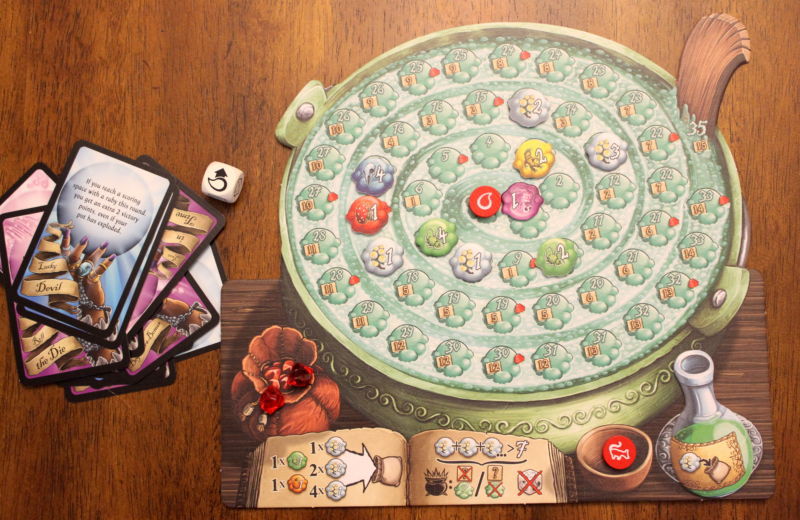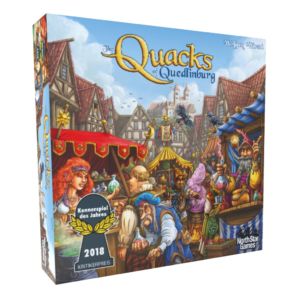

cardboard.arstechnica.com.
Who knew that being a snake-oil salesman was so much fun?
Last summer, the board game Die Quacksalber von Quedlinburg won a major award from the German press, and buzz was big on both sides of the Atlantic. Now out in English as The Quacks of Quedlinburg from North Star Games, we’ve finally had a chance to put this bag-building, press-your-luck game through its potion-making paces.

In Quacks, you play one of the titular quacks, a dubious doctor brewing and selling your wares at a pleasant-looking German festival. The festival runs for nine days, so you have nine chances to brew up something potent using ingredients pulled blindly from your bag o’ goodies. Pumpkins, crow skulls, toadstools, mandrakes, spiders, and even rat tails are positive contributions to the cauldron. But draw too many of the white “cherry bombs” (don’t ask—the picture on these chips appears to show snowberries) and your potion will explode—which means you lose out on some of the end-of-round goodies. But if you don’t push your luck, at least a little, you run the risk of being out-potioned by your fellow charlatans.
Once each player has either busted or halted, the potions are scored. Players gain both points and “money” depending on how far around the circular potion track they went that round, and “money” can be used to buy more and better ingredients for your bag going forward.
If it sounds simple at heart, it is—and that’s no criticism. I love me some bag-building, push-your-luck action. But what makes Quacks really shine are the ingredients, which offer all sorts of crazy powers and abilities. (And each ingredient comes as part of four different sets, with each having a completely different ability.)
For instance, the red toadstool chips in set one allow you to move extra spaces on the potion tracker depending on how many orange pumpkin chips are already part of your potion. But the red toadstool chips in set three provide extra movement only if the previous chip played was one of the white “cherry bombs.”
The yellow mandrakes in set two double the potion tracker movement points for whatever you next draw out of your bag. But the yellow mandrakes in set three change the threshold for potion explosions; the more mandrakes in the potion already, the harder it is to bust.
In addition to their different powers, most ingredients also come in three different “strengths,” the highest of which move you further along the potion track when drawn and provide more powerful forms of their bonus (but which also cost significantly more to buy).
Did I mention the bonus die you get to roll at the end of each round, providing some little goodie to whoever brewed the best potion? Or the fortune-teller cards that provide a unique bonus or power in each round of the game? Or the way that two additional ingredients come into pay after a couple of rounds? Or your “flask,” which lets you remove a single white “cherry bomb” from your potion and throw it back into your bag? Or the rubies you can acquire, which can then be cashed in to replenish an empty flask? Or the modest “catch-up” system using rat tails on the scoring board to give everyone behind the game’s leader a small per-round boost?
The combination of straightforward, exciting gameplay with so many small additions and variants gives you plenty to think about beyond the basic “should I pull another chip from my bag” question. You have to decide how to build your bag in a given game, buying up ingredients that combo well together or that steer you in a specific strategic direction. You have to decide if you value rubies and flasks or if you prefer to live without a safety cushion. And is it more profitable to hang right behind the leader until near the end?
-
-
The game’s six main ingredient colors.
-
You personal player board, where you brew your diabolical concoctions.
-
Some of the “fortune teller” cards that alter each round slightly.
If the gameplay starts to feel a little same-y, just swap out ingredients for another set and you will approach the game quite differently. (Quacks also includes a slightly more advanced variant on the back of each player board.)
Quacks is not a deep strategy game. But it is a terrific press-your-luck, choose-what-goes-in-your-bag experience. I have loved every minute of my playtime so far because everything about the Quacks experience is distilled “essence of fun.” Nothing is baggy or extraneous. There is no downtime, nor does game length increase much with player count. (Players all build their potions simultaneously, drawing ingredients as quickly as they like.) And the artwork is great.
While the game did win the German “Kennerspiel” award for a “complex” board game, don’t let that scare you if “complex” is not your jam. This is a family-weight title suitable for smart kids of 9+, not a two-hour strategy slugfest characterized by players glowering in concentration as they min/max resource conversion tables.
No, Quacks is a game of shouts and sighs, laughter and table-pounding. Its soundtrack isn’t silence but something more like “Draw draw draw YES draw CRAP draw draw draw YES draw YES raw BOO Draw draw draw DAMN YOU, CHIPS draw draw I SHOULDN’T DRAW AGAIN draw I SHOULD DEFINITELY STOP draw I BUSTED!” It’s fast, it’s fun, and penalty for busting isn’t so onerous that you’ll just want to quit the game, convinced you can never win. Unlike the potions you brew during player, Quacks won’t blow up in your face. Highly recommended—and if you like it, an expansion is coming this summer.









